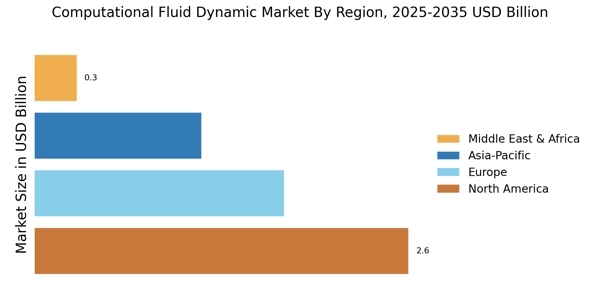Rising Demand for Energy Efficiency
In the context of the Computational Fluid Dynamic Market, the rising demand for energy efficiency is a pivotal driver. Industries are under increasing pressure to reduce energy consumption and minimize environmental impact. CFD tools are instrumental in optimizing fluid flow and thermal management, which can lead to significant energy savings. For example, in the HVAC sector, CFD simulations help design systems that maximize airflow efficiency while minimizing energy use. The market for energy-efficient solutions is expanding, with projections indicating a potential increase in demand for CFD applications in energy management by approximately 15% over the next five years. This trend underscores the importance of CFD in achieving sustainability goals across various sectors.
Emergence of Cloud-Based CFD Solutions
The emergence of cloud-based CFD solutions is transforming the Computational Fluid Dynamic Market. These solutions offer scalability, flexibility, and cost-effectiveness, allowing organizations to access powerful CFD tools without the need for extensive on-premises infrastructure. Cloud computing enables real-time collaboration among teams, facilitating faster decision-making and innovation. The market for cloud-based CFD solutions is anticipated to grow at a CAGR of approximately 14% over the next five years, driven by the increasing adoption of cloud technologies across industries. This shift not only democratizes access to advanced CFD capabilities but also enhances the ability of organizations to conduct complex simulations efficiently.
Growth in Aerospace and Automotive Sectors
The Computational Fluid Dynamic Market is significantly influenced by the growth in the aerospace and automotive sectors. These industries are increasingly utilizing CFD to enhance vehicle performance, safety, and fuel efficiency. For instance, the aerospace sector employs CFD for aerodynamic analysis, which is critical for aircraft design and performance optimization. Similarly, the automotive industry leverages CFD to improve vehicle aerodynamics, leading to better fuel economy and reduced emissions. The aerospace market alone is expected to witness a growth rate of around 8% annually, while the automotive sector is projected to grow at a rate of approximately 6%. This robust growth in both sectors is likely to drive demand for advanced CFD solutions.
Increased Focus on Research and Development
The Computational Fluid Dynamic Market is witnessing an increased focus on research and development (R&D) across various sectors. Organizations are investing heavily in R&D to innovate and develop new products that meet evolving consumer demands. CFD plays a crucial role in this process, as it allows for the simulation of fluid dynamics in various applications, from biomedical devices to renewable energy systems. The R&D expenditure in sectors utilizing CFD is expected to rise, with estimates suggesting a growth of around 12% in the next few years. This emphasis on R&D not only fosters innovation but also enhances the overall capabilities of CFD tools, making them more versatile and applicable across different industries.
Technological Advancements in Simulation Software
The Computational Fluid Dynamic Market is experiencing a surge in technological advancements, particularly in simulation software. Enhanced algorithms and improved computational power are enabling more complex simulations, which are crucial for industries such as aerospace, automotive, and energy. For instance, the integration of high-performance computing (HPC) allows for real-time simulations, significantly reducing the time required for product development. As a result, companies are increasingly adopting these advanced tools to optimize designs and improve efficiency. The market for simulation software is projected to grow, with estimates suggesting a compound annual growth rate (CAGR) of over 10% in the coming years. This growth is indicative of the industry's shift towards more sophisticated modeling techniques, which are essential for maintaining competitive advantage.

















